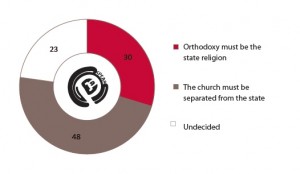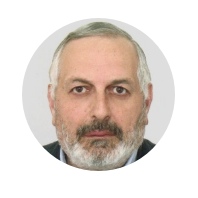Orthodox Christianity as the state religion
07/14/2011The results of the All-Russian representative survey conducted by the service SREDA (field work: Public Opinion Foundation “PENTA”, sample 1500 people)
30% of Russians are in favour of having Orthodoxy as the state religion. Almost the same situation was recorded ten years ago: in Spring 2001, 29% of respondents gave the same answer (according to a survey conducted by the fund “Obschestvennoe Mnenie”). The number of those in favour of separation of church and state has decreased, but only slightly: in 2001 there were 53%; in 2011 it’s 48%. In general the poll results indicate stability in the time while the church and the state are actively working out their methods of collaboration.
Do you think that Orthodox Christianity should be the state religion in Russia or should the church be separated from the state?
While in 2001, 53% were calling for a separation of church and state, in 2011 it’s 48%. Compared with 2008 the number of those supporting separation of the church and the state has, if only a little, increased – from 45% to 48%; but the number of those struggling to answer (‘undecided’) has also fallen.
One third of Russian citizens think that Orthodoxy should be the state religion. Women are more likely to say so. And men are more often in favour of separation.
More often Orthodoxy as the state religion is supported by the respondents involved in the household and the poor struggling to find money for clothing and footwear, as well as the respondents who support the “Edinaya Rossiya” and are planning to go to the elections in 2011 and 2012.
Nearly half of respondents thought that the church should be disestablished. More likely to think thus are people with higher education (57%), students and pupils, people of average wealth and childless respondents. The need for separation of church and state is often voiced by Russians who support the Liberal Democratic Party, as well as those who are interested in political life but have no party preference.
Quite predictably, the non-believers more often speak about the need for separation. And, on the contrary, Christians of the Russian Orthodox Church are more likely than the members of other religions to speak in favour of making Orthodoxy the state religion. However, within the group of Orthodox Christians, just little more than one third (35%) supports the idea of giving Orthodox Christianity the status of the state religion of Russia. This number is even lower than it was ten years ago (37% in a survey by “Obschestvennoe Mnenie”). Muslims more often than the others choose the option ‘undecided’ (44%).
More frequent to believe that Orthodoxy should be the state religion are inhabitants of small towns with a population of 50 to 250 thousand people. Muscovites, on the other hand, are more in favour of separation of church and state. And respondents who live in villages often experience difficulty with the answer (are ‘undecided’).
Respondents who support the separation of church and state are more likely to live in the Northwest Federal District, while inhabitants of Volga Federal District are more likely to say that Orthodoxy should be the official religion of Russia.
Among those who tended to have no specific views on the state status of Orthodoxy were the following: respondents with low education, respondents engaged in agriculture or forestry, those who have not yet decided about their electoral behaviour.




